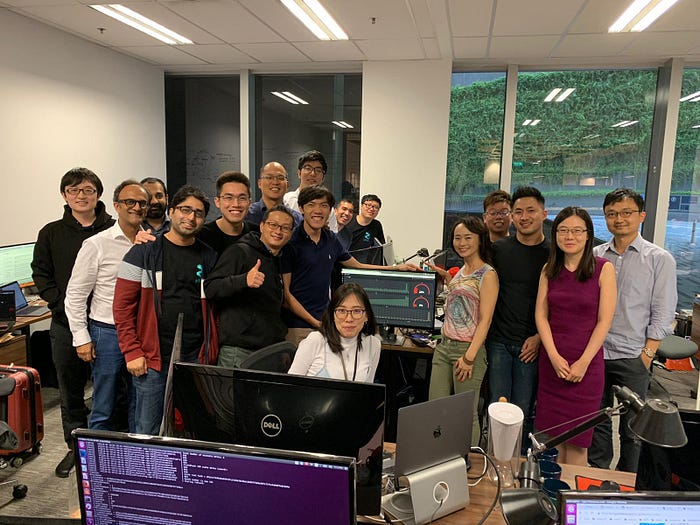Zilliqa Mainnet: The Launch and Beyond
Dear community,
We are excited to announce that the Zilliqa mainnet has now been launched. You may visit the block explorer at https://explorer.zilliqa.com. For mining on Zilliqa mainnet, please refer to https://github.com/Zilliqa/Zilliqa/wiki/Mining.

The Zilliqa story began in June 2017, and it’s since been a truly exciting journey for us. When we started out, we had the ideas on how to implement sharding, but the design of the secure smart contract language that we wanted to implement was still in its early stages. Once we finished the design of the language, we had to research an efficient method to run contracts on a sharded architecture. At each step, this project has taught us to turn challenges into accomplishments. Our research kept pace with our development and we intend to maintain this post mainnet launch.
Any of this would not have been possible without the strength of our community, and we are grateful to you for supporting our vision, our progress to date, and for helping us to deliver on this important milestone. The team would also like to take this opportunity to thank our partners and advisors for providing their useful feedback and advice along the way.
As we mentioned in our earlier blog post, the Zilliqa mainnet is quite an accomplishment with several innovative technologies being made live. With this launch, Zilliqa is now the first public blockchain platform to successfully implement sharding. It has made years of research, testing and trials into a public and live platform, that will lay a solid foundation for the not just new generation blockchains, but also a new generation of decentralised applications. You can read more about our unique approach to sharding here.
Today, even as we celebrate the launch of our mainnet, we believe that this is just the start of the journey for us all, as we work together to realise a future where decentralised applications are a part of our daily lives.
Looking beyond the launch, we will continue to add new features, enhance the platform, and further our research. I would like to share some of our futures plans with you in this post, regarding token swap, research and development, as well as nurturing the ecosystem.
Token Swap
We are glad to announce that we are working with the following exchanges to support the token swap from ERC20 to native ZIL tokens, which is expected to commence from late Q1 2019. The exact timelines will be different for different exchanges. Please note that there is no action required from ZIL token holders at the moment.
The bootstrap phase will help protect the newly launched network, which will end after 313 DS epochs. There is no precise time for each DS epoch. 313 DS epochs should run for roughly a month’s time. (313 is also the number we chose for SLIP-0044 for ZIL.)
After the bootstrap phase ends, till June 2019, we will work with different exchanges for swapping ERC20 ZIL to native ZIL tokens. During this period, no change will be made to the ERC20 ZIL tokens, which will continue to be transferable. We expect the token swap to be completed by June 2019, and we plan to freeze ERC20 ZIL tokens thereafter.
Please look out for announcements going forward.
- Binance
- Upbit
- Huobi
- Korbit
- Coinone
- Gate.io
- Bittrex
- Gopax
- Koinex
- Coinbase and Coinbase Custody
- Coinhako
- KuCoin (added)
In addition, the following wallets will support our native ZIL tokens. Similarly, the commencement date will vary with each wallet, so do monitor announcements. Please note that some of the wallets below do not support ERC20 ZIL tokens and will only start supporting native ZIL tokens at a later stage. Please DO NOT send ERC20 ZIL tokens to the wallets unless you are sure they are already supporting ERC20 ZIL tokens now.
List of wallets supporting native ZIL tokens:
(some are still work-in-progress)
Both lists above will be updated as more exchanges and wallets come onboard. We will continue to keep everyone updated on the swap.
Future Research & Development
Mainnet is only the beginning as we now have the secure and scalable infrastructure on which we can add new features and protocols. Our research and development team is planning to work on the following areas in the coming years. These topics are non-exhaustive and subject to change along the way. Some of the exploratory work has already started, while some will only be taken on at a later stage or be replaced by other interesting topics.
Efficient backend for Scilla: Throughput and latency of a blockchain heavily rely on its ability to process smart contracts efficiently. It is hence imperative that computation and I/O heavy contracts are handled in the most efficient way possible. In the current version, Scilla comes with an interpreter (with a minimal trusted codebase) that interacts with the core blockchain in a blackbox manner, i.e., it expects the current contract state and the function (aka transition) to be invoked and returns the updated state of the contract. The current state fed to the interpreter can, however, be large and may potentially create I/O bottlenecks. There are two possible ways to improve upon this. The first is to design a better mechanism to fetch and feed only a subset of the state instead of the entire state to the interpreter. The second is to develop a full-fledged virtual machine. We plan to investigate both in the coming future.
Support for NIZK (aka zkSNARK) proofs: Non-interactive Zero-knowledge proofs or zkSNARKs have found apt applications in the field of blockchains. First, they allow users to prove in a privacy-preserving manner the knowledge of data that satisfies a certain set of constraints. For instance, with the use of zero-knowledge techniques, it becomes possible for a user to hide the transaction amount in a transaction and yet prove to the miners that she has enough balance in the account.
Beyond this privacy use case, zkSNARKs are being actively applied in the area of verifiable computations, where, a client performs a computation-heavy task off-the-chain and produces to the miners a “proof of work” that can be verified very efficiently. This specific usage of zkSNARKs can lead to a trustless and secure off-chain computation layer atop Zilliqa.
Furthermore, zkSNARKs can also be used to design succinct blockchains to reduce the storage requirements for lookup and seed nodes and lower sync-up time for new nodes.
Efficient smart contract sharding: Zilliqa employs a neat and simple mechanism to process smart contracts on a sharded architecture. We, however, believe that there are ways to make this smart contract sharding smarter by leveraging the language component Scilla. This may introduce new language constructs for certain data types that smart contract developers may use to extract the best out of the sharded architecture.
Formal verification: Scilla was designed as a verification-friendly smart contract language. Back in December 2017, we had started the initial work on developing the necessary infrastructure to showcase verification friendliness of the language. Do check out some of the earlier results obtained for a crowdfunding contract. Since then, the language has considerably evolved and as a result, the older infrastructure has to be rebuilt and refined. Hence, we are looking forward to working on this aspect that would allow smart contract developers to prove safety and correctness properties of their contracts.
High-level language integrations with Scilla: Scilla was designed to be an intermediate-level language. This unique positioning allows developers to write safe and yet human-readable smart contracts. However, contracts written in Scilla tend to become longer and verbose compared to similar code written in traditional languages. We intend to work on a higher-level extension of Scilla with the goal of making contract development in Scilla simpler and less time-consuming.
Incentive and staking mechanisms for blockchains: There have been interesting proposals recently on secure and efficient ways to incentivize miners or validators in blockchain networks. We plan to conduct research on the fundamental principles of such topics to understand better the security and economic implications of such mechanisms. This research may provide us with insights into further exploration of lightweight staking and slashing conditions that could be leveraged to enhance the economics of Zilliqa’s ancillary infrastructures.
Nurturing the Zilliqa Ecosystem
We have made tremendous progress in the past 18 months, and will continue to strive for innovation and adoption for the next 18 months and beyond. As we further develop our technology, we now have an infrastructure to support the amazing dApps from our dev community, to build innovative solutions, and to grow our ecosystem.
To that end, we know that a blockchain protocol cannot succeed without a talented community looking to build on it, which was why we started the #BuildonZIL Ecosystem Grant Programme. Applications for the third wave is now open — if you’re keen on building your own base layer applications, innovative dApps or have interesting research ideas, register your interest here. We also regularly engage with developers through workshops and meetups globally. In fact, we’ll be at the upcoming ETHDenver, for a panel discussion and the BUIDLATHON, and Developer Week in San Francisco, where our lead application developer will be conducting a workshop — more info here. If you’re at these events, please reach out to us.
In terms of adoption, we will continue to focus on enabling blockchain-powered solutions that bring real value to users rather than “blockchain for the sake of blockchain”. We believe that by demonstrating the potential of the technology, the industry will be able to grow in a meaningful manner. We will also continue to nurture the ecosystem through grants and other initiatives such as our digital advertising project with Mindshare and other players Project Proton, Hg Exchange which is aiming to be the first member-driven private investment exchange in Southeast Asia. We also hope that BOLT, EMONT Frenzy by Etheremon, and exciting games from Krypton and MixMarvel take off with consumers.
Additionally, with our strong roots in academia, we will look at areas where we can help to further industry-related research, such as through our support to the National University of Singapore’s CRYSTAL (Cryptocurrency Strategy, Techniques, and Algorithms) Centre. We also believe strongly in supporting and nurturing the next wave of innovators. We are working with higher education institutes, through initiatives such as the Future of Blockchain competition (with top UK universities namely Oxford, Cambridge and Imperial College London), to get students interested in blockchain, and to support ideas with potential through grants or business advice.
The name Zilliqa is a play on the word ‘silica’. Just as Silicon powers the computing industry, we hope that with Zilliqa, we will one day see a future where blockchain radically impacts the way we all live, work, and play.
Once again, we would like to thank our community for your patience, and being on this journey with us. This is the beginning of what will be an amazing year for Zilliqa. We look forward to many more exciting developments, and sharing them with you all.
As always, please feel free to connect with us in any of our social channels:
Discourse Forum: https://forum.zilliqa.com/
Telegram: https://t.me/zilliqachat
Slack: https://invite.zilliqa.com/
Twitter: https://twitter.com/zilliqa
Reddit: https://www.reddit.com/r/zilliqa/
Github: https://github.com/Zilliqa/zilliqa
Gitter: https://gitter.im/Zilliqa/ (Dev-related topics including the Ecosystem Grant)
